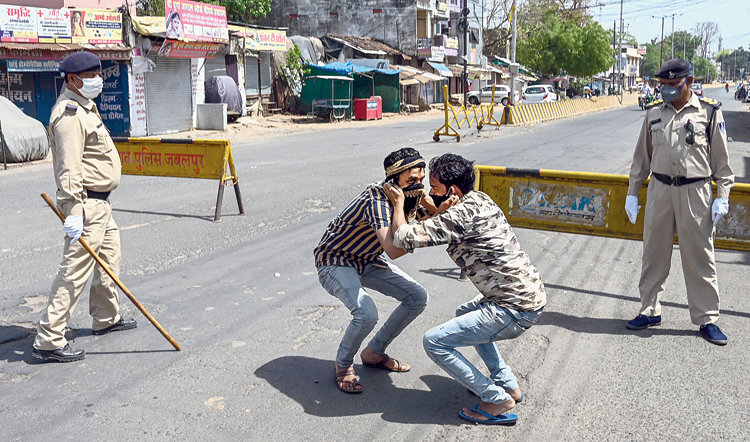The Commonwealth Human Rights Initiative (CHRI) has come out with a set of suggestions for police while enforcing the lockdown, pointing out that cop brutality in the first week of the restrictions has dehumanised the State response to the coronavirus pandemic.
Acknowledging that the police are dealing with an unprecedented situation for which they are not trained and highlighting the need for the law-enforcers to themselves take precautionary measures against the virus, the CHRI, a civil society organisation, has essentially drawn up a set of guidelines as a template for state police heads to frame a holistic plan to deal with the health emergency.
While the police are not only involved in enforcing the lockdown but also in the distribution of food to the needy at some places, the lasting images of law enforcement during this phase are the blue-and-black blunt bruise marks of lathi blows on people’s backs and violators being made to crawl on all fours as punishment.
Flagging such measures, the CHRI has stressed the need to minimise the use of force and classify as serious police misconduct the beating of people and making them “roll, crawl, squat, do sit-ups... or humiliating acts as public punishments for alleged violation of the lockdown”. It also sought appropriate punishment for such acts by the police.
Force should be used only if there is fear of life or property being endangered, that too, to the minimum extent necessary, the CHRI pointed out.
The CHRI highlighted the need for strict instructions to ensure that exceptional circumstances such as internal political instability or public emergency are not invoked to justify any departure from the basic principles.
Since the police are the crucial liaison point between the people and essential services, orienting the personnel to this new task should be prioritised, the CHRI said. It sought the establishment of a “stop, verify and assist” protocol for dealing with people on the streets, and called for limiting arrests and detentions for lockdown violations as it could endanger lives during the pandemic that requires social distancing.
Given the difficulties that vulnerable groups — women, senior citizens, disabled persons, homeless, migrant workers, sex workers, trans persons and certain minority groups — have in accessing services in normal times, the CHRI has said special efforts should be made to ensure that they do not get further marginalised during the lockdown.
An entire section of the guidelines has been devoted to protect police personnel from the coronavirus in view of their job compulsions. Seniors have been asked to draw up a list of dos and don’ts for the cops out in the field.
The CHRI said the police should be assured of guaranteed leave with pay if they fall ill and existing medical insurance should cover their treatment costs.











